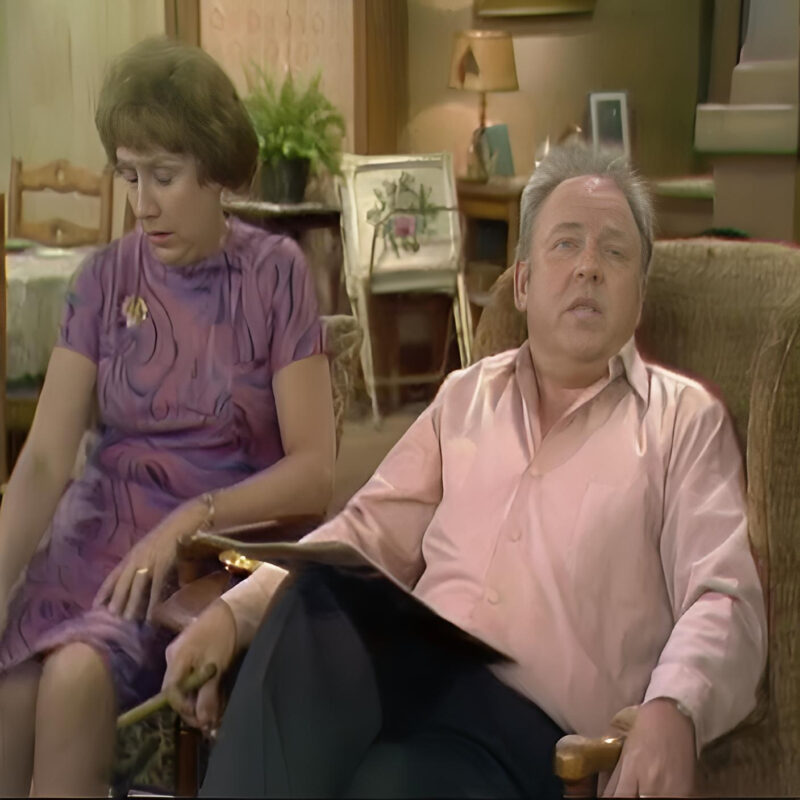
The following feature is adapted from LIFE’s special edition “All in the Family: TV’s Groundbreaking Comedy,” which recently celebrated its 50th anniversary.
On Tuesday, January 12, 1971, television audiences were greeted with an unusual disclaimer before the new CBS show All in the Family. The message informed viewers that the program would cast “a humorous spotlight on our frailties, prejudices, and concerns.” As the episode began, Carroll O’Connor and Jean Stapleton, playing Archie and Edith Bunker, sang the show’s theme song, “Those Were the Days,” at a spinet piano draped with a doily:
Boy, the way Glenn Miller played.
Songs that made the Hit Parade.
Guys like us, we had it made.
Those were the days.
This nostalgic tune evoked memories of prewar big band music while hinting at the biting social satire of Bertolt Brecht and Kurt Weill’s The Threepenny Opera. Archie’s longing for the era of Herbert Hoover, whose presidency preceded the Great Depression, set the tone for the show’s exploration of outdated yet pervasive prejudices.
The show quickly stirred confusion. When Archie and Edith return from church, Edith is horrified that Archie cursed at the minister. Their daughter Gloria and son-in-law Mike try to lift the mood with an anniversary lunch. However, Archie soon launches into a tirade against various minorities and liberal groups, calling Edith a “silly dingbat” and Mike a “meathead.”
Television had never seen a character like Archie Bunker—a blunt, beer-swilling loading-dock worker with a massive chip on his shoulder. He was a far cry from the friendly faces on Hee Haw or the paternal figures like Jim Anderson from Father Knows Best.
CBS anticipated a flood of angry calls and bolstered its phone lines in preparation. Surprisingly, the backlash was minimal, and only 15 percent of viewers tuned in initially. Critics were divided, with Variety praising it as “the best TV comedy since The Honeymooners,” while LIFE’s John Leonard dismissed it as “a wretched program.”
For 13 weeks, All in the Family tackled controversial topics head-on. In one episode, Archie is shocked to discover his tough-guy friend Steve is gay. Another episode deals with Gloria’s miscarriage. Creator Norman Lear, who grew up hearing hate-filled radio broadcasts, used the show to address racial divides and bigotry, often through humor. Mike Evans’ character Lionel Jefferson became a key figure in challenging Archie’s prejudices without being offensive.
Racial issues remained a central theme. Archie’s derogatory term for Mike was “dumb Polack,” and he is horrified to learn that a Black family has moved into their neighborhood. This family, the Jeffersons, introduced audiences to characters as stubbornly prejudiced as Archie.
The show’s relevance was underscored by real-world events like the 1970 Hard Hat Riot, where construction workers clashed with antiwar protesters. Films like Joe, about a bigoted welder, also mirrored the tensions depicted in All in the Family.
The show’s impact was undeniable. By the season’s end, it had climbed the Nielsen ratings, becoming a national sensation. Archie’s character, while deeply flawed, resonated with many Americans, particularly blue-collar workers. O’Connor’s performance revealed a complex man struggling to understand societal changes, making Archie both loathsome and pitiable.
Edith Bunker, portrayed by Stapleton, provided a counterbalance to Archie’s bluster. Her character embodied tolerance and fairness, often revealing unexpected insight. Stapleton’s portrayal made Edith a beloved figure, representing many women of her era grappling with the emerging women’s movement.
Mike, played by Rob Reiner, represented the counterculture, constantly clashing with Archie’s conservative views. Gloria, their daughter, bridged the generational gap, evolving from a subservient wife to an advocate for women’s rights.
All in the Family tackled taboo subjects like infidelity, menopause, and homosexuality, pushing the boundaries of television. Lear’s intent was to provoke thought and conversation, making viewers confront their own biases. Despite initial criticism, the show’s daring approach to social issues earned it acclaim and a lasting place in TV history.
Archie Bunker’s household became a microcosm for examining American society, sparking discussions across the nation. As the show gained popularity, it even influenced political discourse, with politicians referencing “the Archie Bunker vote.”
All in the Family’s legacy endures as a groundbreaking comedy that dared to address the complexities of human prejudice with humor and honesty, leaving an indelible mark on television and society.
